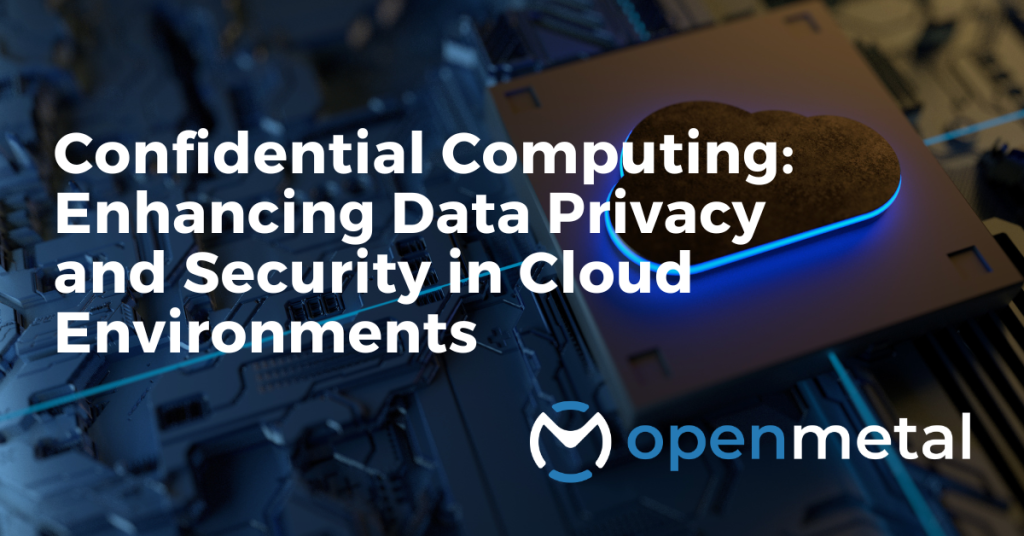What is Confidential Computing and How it Works
The need for confidential computing arose in response to the changing landscape of data security challenges, particularly in cloud computing, multi-tenant environments, and scenarios involving sensitive data processing. Stringent data privacy regulations (especially in highly regulated industries like healthcare, finance, and now AI), insider threats, and the ever rising sophistication of cyberattacks continue to drive the need for stronger security mechanisms around data storage and usage.
Confidential computing addresses this growing need to secure data throughout its entire lifecycle, including when it is being processed, a stage traditionally vulnerable to attacks. It does this by enabling computations to occur in a secure and isolated environment. This is achieved at the hardware level through Trusted Execution Environments (TEEs). The TEE is a secure area of the processor that isolates sensitive computations from the rest of the system, ensuring protection from malware and making it harder for malicious attackers to access or tamper with sensitive data. Confidential computing also relies on attestation via a hardware root of trust that is established during the boot process, where the hardware verifies that the code is signed and trusted. This ensures that only trusted code can be run in the TEE.
Intel® Software Guard Extensions (SGX), Intel® Trust Domain Extensions (TDX), AMD® Secure Encrypted Virtualization (SEV), and Arm® TrustZone are some of the hardware-based TEEs leveraged by confidential computing.
Key Benefits and Use Cases of Confidential Computing
Confidential computing technologies ensure that:
- Sensitive data/workloads can be executed in isolated environments/secure enclaves.
- Data is encrypted even while it is being processed.
- Attestations (cryptographic proofs) can be produced to provide assurance of the secure handling of data and computations.
Confidential computing provides a number of benefits across a variety of use cases:
- Since the data is secured and encrypted even while being processed, it’s much harder for malicious parties to steal sensitive information. This is particularly important in multi-tenant public cloud environments, where even the cloud service provider cannot access any sensitive data that its customer wants to protect.
- Highly regulated industries such as healthcare and finance, that have strict compliance needs (HIPAA, GDPR, etc.), benefit from the privacy and security provided by confidential computing, making it easier to meet compliance requirements.
- Within highly competitive industries, insider threats are a real issue. With TEE in place, even system admins and cloud service providers cannot access confidential data while it is being processed.
- Blockchain, cryptocurrency, and other cryptographic applications can and should take advantage of the security and data integrity gained through confidential computing practices.
- For companies that need to share encrypted datasets, having the computations being done in the TEE ensures data privacy for all parties involved. An example would be healthcare institutions working on research projects together, where with TEE they can process sensitive health records while maintaining patient privacy. Another rising use case for confidential computing is AI and Machine Learning, where machine learning models can be run on encrypted datasets to protect the confidentiality of both the data and the model itself.
Future of Confidential Computing
The Confidential Computing market size reached $5.3 Billion in 2023. The market is expected to reach $59.4 Billion by 2028, exhibiting a growth rate (CAGR) of 62.1% during 2023-2028.
Source: Markets and Markets
The massive drive and increased demand for cloud computing and the corresponding need for increased data privacy and security in these cloud environments ensure significant growth in confidential computing technologies over the next few years. As the technology matures, more robust hardware-based protections and expanded support from cloud providers like Azure, AWS, and Google Cloud are expected. Key advancements will likely focus on improving performance while minimizing the overhead from encryption and isolation processes.
It is expected that innovations in remote attestation, live migration of confidential workloads, and greater integration of confidential computing into machine learning and AI workflows will drive the broader adoption of confidential computing, particularly in industries like finance, healthcare, AI, and government. The overall trend points towards making secure, privacy-preserving cloud computing more accessible and scalable across the ecosystem.
Read More on the OpenMetal Blog




































